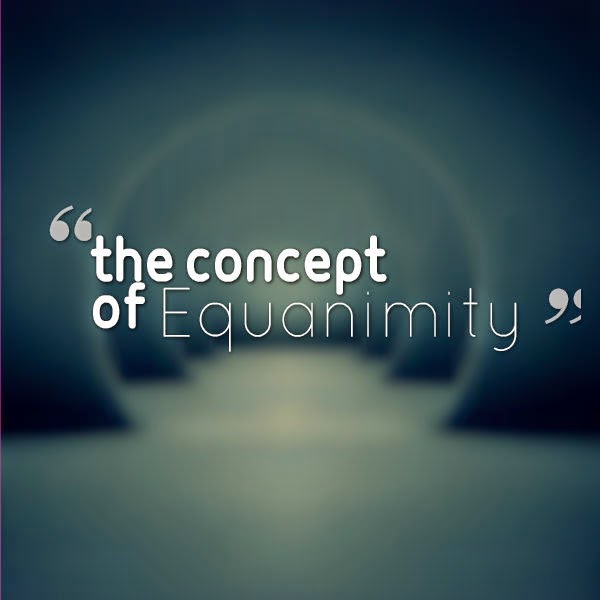The Concept of Equanimity !
Equanimity comes from a Latin word æquanimitas, which means to have an even mind. But the concept goes much deeper. Much of all ancient philosophies and religions talk about equanimity.
Aequss meaning even, and Animus meaning mind/soul.
Marcus Aurelius, one of the stoic philosopher and an emperor in his book Meditations stated that:
When force of circumstance upsets your equanimity, lose no time in recovering your self-control, and do not remain out of tune longer than you can help. Habitual recurrence to the harmony will increase your mastery of it.
In the context of Sanatan Dharma (Hinduism) Equanimity is used to describe the Brahman Nature. In more detailed understanding since the Brhaman cannot ever be explained. We can just rejoice its being. Hence Equanimity means the unattached and undisturbed being'ness. Which is what we all are primarily as. Not the state of mind which we exist upon but the pure sense of nature. The real nature. So, equanimity can be felt at the stage of enlightenment. This is bit too abstract. Since pure awareness is a very vague phenomenon for us to comprehend.
Patanjali's Yoga Sutra also mentions Equanimity as one of the four subliminal attitude.
Equanimity (Upeksha), Loving Kindness (Maitri), Compassion (Karuna) and Joy (Mudita)
Equanimity here means the ability to connect oneself fully with the reality without possessiveness or the clinging. Hence we can also see that equanimity consists of non attachment and even mindedness. But we must be aware that it doesnt mean to be indifferent to the worlds and its realities. Without equanimity there is no love. It just becomes possessiveness. The concept of equanimity can also be seen as the foundation for the understandings of Ahimsha (non violence).
The Bhagvata Geeta explains, "Perform all thy actions with mind concentrated on the Divine, renouncing attachment and looking upon success and failure with an equal eye. Spirituality implies equanimity."
Spirituality implies equanimity.
The Buddhist concept of Equanimity relates to the ones ability to look at the world and the sentiment beings as equals, irrespective of the personal relationship at the present. (Sama Bhava)
Ven. Shanghagena, a Buddhist monk eplains that equanimity is the higher state of happiness that is steady and lasts longer.
Thich Nhat Hanh, a Vietnamese Zen Monk in his book Teachings on Love explains, “In Sanskrit, ‘upa’ means over and ‘iksh’ means ‘to look.’ You climb the mountain to be able to look over the whole situation, not bound by one side or the other.” From that vantage point one accesses another aspect of equanimity, “samatajnana” or the wisdom of equality, which Nhat Hanh describes as “the ability to see everyone as equal and not discriminate between ourselves and other people.” When embroiled in conflict, the equanimous will maintain impartiality in an effort to truly understand others’ points of view. They drop their discrimination in order to truly love. In this way, the self, the ego, diminishes and they become one.
You climb the mountain to be able to look over the whole situation, not bound by one side or the other.
Hence equanimity can be seen as a way to connect to the whole flip-flopability of life. The present'ness with absolute watchfulness.
Practicing equanimity might allow us to undo the ills of errant thinking. We need to be aware that they exist. And as we realize that, we can then free ourselves from the dichotomy of good and the bad. We reach to a state of contentment and gratitude. Even if not the higher forms of contentment. Equanimity would surely bring joy in life. As one would be acceptable to the movements of life.
Carl Jung explains, Even a happy life cannot be without a measure of darkness, and the word happy would lose its meaning if it were not balanced by sadness. It is far better take things as they come along with patience and equanimity.
Equanimity is similar to Astavakra's concept of Shakshi Bhav (Witnessing). Astavakra explains that when witnessing happens, one attains the highest light. Osho further goes on explaining that Shakshi Bhav awakens the inside, and brings equanimity in the outside.
Equanimity is the shadow of witnessing. - Osho



Comments